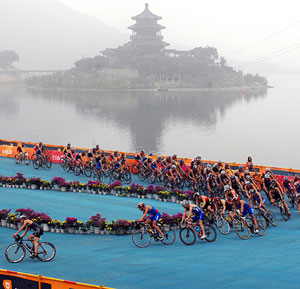Management versus peloton
Over the weekend The Giro d’Italia featured a circuit race around Milan. This, to remind cycling fans, in this grand tour centennial year, of the Giro’s special attachment to this fine Italian city.
The riders, however, protested the stage by staging a sit-in or, sit-on if you prefer, not getting out of their saddles to accelerate past 20mph the entire day.
The problem, say the riders, is a lack of attention by tour organizers to rider safety. I read a report in the New York Times referencing a Saxo Bank rider clocked at 73mph on a descent during Stage 7. This is emblematic of the issues angering the riders, which include problems with the course on which the circuit race was contested.
Professional sportsmen are no different than any other class of worker. They will fight for safety and fairness in the workplace, and for what they see as appropriate pay and conditions.
Or not.
About a decade ago I chronicled the history of pro triathletes’ attempts to unionize; suffice it to say that, during the intervening decade, it’s been more of the same. While you hear a smattering of complaints about the prize money in a non-Kona Ironman, which remains the same as it was almost 20 years ago, you don’t see anything approaching a common voice about athlete pay.
Happily, our sport’s pros don’t commonly run up against safety issues in triathlon—and it’s not like safety is not an issue. Were I putting on either a triathlon or a bike race (and i have produced both), my first thought is for athlete safety. I think any speed in excess of 55mph is too much to expect of bike racers. It’s not rodeo, it’s not cage fighting, it’s bike racing. Descents in the Dolomiti should be on roads like Passo Pordoi, where there are 33 switchbacks on one side and 27 on the other (and each side is only about 7mi long). These turns keep descent speeds down to 40mph or less, most of the time, and technical descents ask more of a rider's talent and less of his skin.
When most or all of the rider’s strong men—not just Armstrong, but Simoni, Basso, Di Luca—agree that the stages are too dangerous, were I a race director I’d feel overmatched on this issue (and rightly so).
i certainly hope, for the riders' sake, the NYT article was wrong when it wrote: "But Sunday’s course [the Giro’s RD] said, was fine. What proved it, he said, was when the teams ramped up their speed at the end of the race, without any incidents." The fact that a small segment of the peleton (3 or 4 teams out of 22) was able to race two of a scheduled 10 laps without a crash "proved" that the course was safe?
I have yet to face my first “worker backlash.” Maybe my time is coming (Herbert and Rappstar, are you planning a strike?). Certainly I’ve infuriated particular professional athletes, because I do require adult, professional behavior from an athlete who styles him or herself a professional (e.g., a recent forum thread on mechanicals). But in the main, the pro athletes seem to have been pretty happy with me, and I like to think it’s because I’ve been respectful of them.
I’ve also been disappointed in them because—like Mark Cavendish in the Milan circuit race—many pro triathletes have proven more interested in their personal, short-term reward than in the long-term collective good of the worker class in which they belong. Were the professional men’s field in an Ironman to stand motionless for 30 seconds after the sound of the gun before commencing the swim, I’d feel a sense of professional pride in our sport’s athletes, and maybe those tasked to run the Ironman would consider adding a few dollars to the prize purse.
But I don’t expect this pre-swim “stand-in” to happen and, until it does, I can’t really blame WTC from returning this money to Providence Equity Partners shareholders—the one worker class who did step up and take a financial risk.



Start the discussion at slowtwitch.northend.network